| Spotlight
Re-making History
Sadia Zafreen Chowdhury
Photo Courtesy: NSUDC
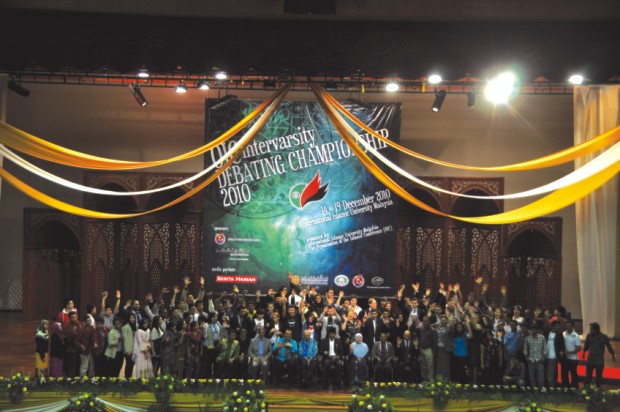
As the year came to an end, North South University Debate Club (NSUDC) said goodbye in its usual grandeur. NSUDC was the first debating club of Bangladesh, to not only consecutively break (proceed beyond the preliminary rounds) through an international tournament (Asian BP), but also was the first team that won the pre-quarters and reached the quarter final of an international debating Championship.
The cherry on the cake was when a team from NSUDC broke as the 2nd team out of 25 teams in a major international debating tournament, the OIC Debate Tournament 2010.
Before going any further lets brush up on some facts and history. There are primarily two types of debate formats, the Asian three-on-three and the British Parliamentary (BP).
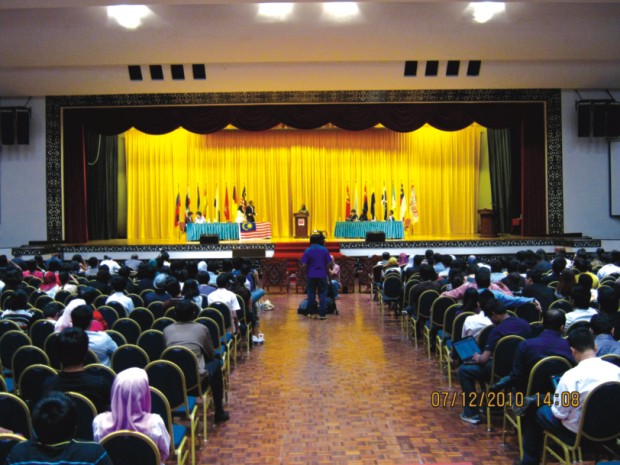
The Asian three-on-three consists of three members on each team. Two teams debate against each other, one being the government and the other being the opposition. The British Parliamentary format, on the other hand, is more intense since four, two-member teams debate simultaneously. Two teams debate in the upper bench and two teams in the lower bench. The upper bench consists of Government 1 and Opposition 1 while the lower bench consists of Government 2 and Opposition 2. This means there are two governments and two oppositions in one debate! As a result it makes the debate for the lower benches extremely challenging since they not only have to rack their brains for better arguments, supporting their allies but also aiming to beat three teams at once! Now that should definitely get your adrenaline pumping!
As for some history, in order to enhance the quality of debate of the Asian teams in the Worlds University Debate Championship (WUDC), the Asian BP tournament was established two years ago. The first Asian BP was held in the Chulalongkorn University, Thailand, where more than 80 teams had participated, and since then it has become the second largest international debate tournament after the WUDC. The major goal of the Asian BP is to help the Asian teams excel at the WUDC.
NSUDC has always been the pioneer in sending debaters to represent Bangladesh and its university abroad. The sheer magnitude of successes achieved in this trip outshined many tours of the past. The three consecutives debate tournaments that NSUDC participated were Asian BP 2010, held in University Putra Malay from December 3 - 8 followed by the Bar Council Human Rights Debate (BCHRD) 2010 competition in conjunction with the International Human Rights Day, from December 9 - 13, held at KDU University College, Malaysia sponsored by BAR council themselves and finally wrapped the international tour with the 1st OIC Intervarsity Debating Championship which is endorsed by the Organization of Islamic Conference , held in International Islamic University of Malaysia from December 14 - 18.
Asian BP 2010
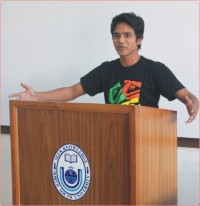 |
A debater of NSUDC. |
It was an absolute delight and honour to represent Bangladesh and North South University in the Asian Circuit. Asian BP is known to be the largest BP tournament after the Worlds where teams from Singapore, Malaysia, Thailand, Indonesia, India, Philippines and Bangladesh are regular participants. NSUDC broke in the last year's Asian BP, and in order to maintain its consistency, NSUDC debaters flew to Malaysia on December 3 to attend the biggest Asian Inter Varsity Debate in British Parliamentary format. This time three teams and four adjudicators were the part of the contingent.
Three teams comprising of Wahidul Bari and Naveed Adnan as Team 3, Mehdi Bin Samad and Nabil Azad Chowdhury as Team 1 and Saad Bin Amjad and Syed Ifthekar Towheed as Team 2. Tanzil, Golam Ishfaq, Sazzad Hossian Rony and Jamil M Akbar went as adjudicators.
A total of five preliminary rounds took place after which only 24 out of 77 teams broke. Issues such as diplomacy, international relations along with environmental and social issues were brought forth. Amongst them the greatest motions were: 'This house would abolish the Euro zone', 'This house would make internet site criminally liable that hosts hate material', 'This house would lift all sanctions from Burma', 'This house would return all cultural treasures back to their place of origin' and 'This house should abolish arranged marriage'.
NSU team 3, comprising of Wahidul Bari and Naveed Adnan broke the double quarters with a staggering nine points and 764 speaker points breaking as the 20th team. With also nine points but less speaker points of 743, NSU team 1 of Mehdi Bin Samad and Nabil Azad Chowhdhury unfortunately could not make through but came around as the 27th team.
 |
| Participants at OIC Interversity Debating Championship 2010. |
The brilliance did not just end there. In the double quarters, NSU faced NUS (Singapore), IUT(Bangladesh) and Bipeds (Indonesia) in a tense match-up but they conquered and broke into the quarters for the first time in the history of the country; this was the furthest that any Bangladeshi team had gone in Asian BP.
To top it all, the final gem in the crown for NSUDC was when the club's dream came true. With great determination and excitement, NSUDC stood in the Pre Council Meeting and expressed its desire to host the next Asian BP right in Dhaka, Bangladesh.
After competing in 3 gruelling rounds of debate at a stretch, Wahidul Bari from NSUDC presented the bid in front of the Asian debate community and persuasively won the bid by a ballot of 19:4 over the other bidding institution proving the amount of PR and support they have internationally! NSUDC landed yet another international debating Championship after the NSU All Asians back in 2008.
This will be the third international debate tournament hosted in Bangladesh and the second by NSUDC. It is also the first time that Bangladesh will be hosting the Asian BP, which is a landmark event for Bangladesh.
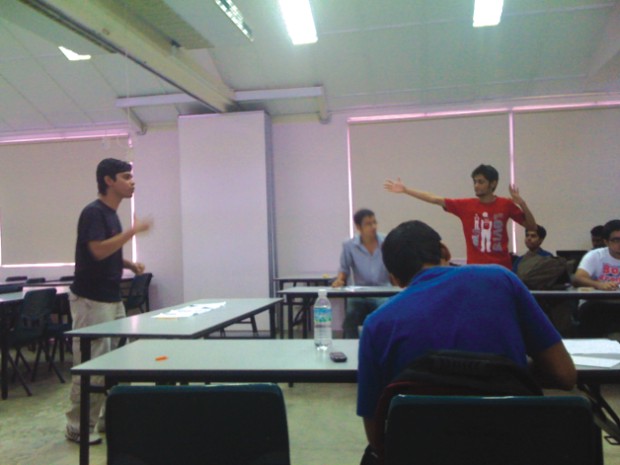 |
Debating today is much more than just an extra carricular activity. |
Bar Council
Keeping in mind the International Human Rights Day, Bar Council of Malaysia held Bar Council Human Rights Debate (BCHRD) 2010, a tournament that is open for all, starting from school children to the lawyers of the country. When the university and the ex- debaters of the international debating circuit, (now either they are professional debate coaches or lawyers in major law firms) gathered together for a debate completion, great things were bound to happen.
NSU team 1 was comprised of Saad Bin Amjad and Mehdi Bin Samad and in the five prelims rounds; they managed to have eight points-just short of one point to break.
OIC debate
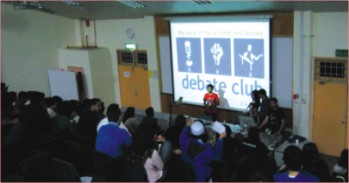 |
The routine practices of a debater. |
A Debate Championship amongst the OIC countries were held in IIUM where 5 teams from Bangladesh participated and NSU was one of them. Out of the 5 preliminary rounds, NSU managed to win 4 debates and broke into the quarters being the 2nd team out of 25 teams.
Out of the two adjudicators of NSU, Sahel and Faria Ahmed, Sahel broke as a judge, and became one of the very few to ever break in the first international tournament. Saad Bin Amjad was awarded the 'Best Blogger of the Tournament (International)' for his much popular blog, www.bddebate.blogspot.com.
During the 17 days stay in Malaysia, debates were won, new friends were made and NSUDC by winning the bid to host the next Asian BP, has made remade history for Bangladesh.
(The writer is a student of BBA at North South University.)
Interview with one of the pioneers of success, Wahidul Bari:
 Q1: How would you describe the quality of debate of this year's Asian BP? Q1: How would you describe the quality of debate of this year's Asian BP?
A: Quality of debate has considerably improved given we made it through to the quarters. But overall the quality of adjudication was also better. It was tough to break and if the teams can keep up this rate of improvement they can definitely do better in the WUDC.
Q2: Having said that would you say there is still a vast difference in the quality of debate between Asian BP and WUDC?
A: Yes there is a great amount of difference and the quality in the Asian needs to improve if they want to make a mark in the WUDC. However we would say that given that Asian BP has only been in action for 2 years, they have shown tremendous improvement and if they keep it up, the difference will cease to exist.
Q3: When talking about the big success story, what was the vision behind bidding for Asian BP 2011?
A: Five years ago in 2006 we first presented the bid to host the 15th All Asians in 2007 and we brought the bid home. NSU was the first to host an international debate tournament in Bangladesh and that being a major success gave us the confidence to bid for the Asian BP 2011.
Q4: What kind of contribution do you think it would make to the Bangladesh debate scenario?
A: It definitely would make a major contribution since it would give more local teams the opportunity to be a part of an international tournament and witness some quality debate. It would be especially beneficial since the WUDC is right after the Asian BP 2011 which will provide local teams adequate practice.
Q5: What is the recipe behind these winning bids?
A: Firstly winning a bid is not an easy task. We had 3 rounds of debate after which we had to plan the bid and then present it. We have to convince a lot of people that we have the potential, the environment and the resources to host a tournament of such magnitude. Answering their unending questions and persuading them to vote for you is indeed a hard task.
In order to win a bid you have to have tremendous support internationally. And to gain that support your debating quality matters after which comes your PR skills. People know you through your debate and through your performance you have to prove that you have a rich international debating culture. We believe NSU has definitely proved to be worth all that and more.
Q6: What will be your final word on the impact Bangladesh will have through Asian BP 2011?
A: NSUDC hosting this tournament will help create more awareness about Bangladesh as a major contributor in the South-Asian debating community. The success of the tour and its previous successes were more about representing Bangladesh than simply representing NSU as in institution. NSU has already hosted the 15th All Asians in 2007 and now winning the bid to host Asian BP 2011 is more a pride for the country as a whole than just NSU. It is so because when a bid is presented the first question asked is which country the bidder is from and in this case the proud answer was Bangladesh. In order to win a bid international support is of utmost importance and that recognition and support can only be achieved through ones debating quality. |

